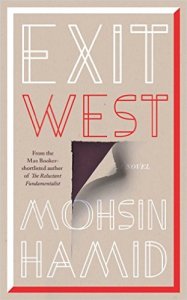Archive for March 2017
Exit West
 This review was first published at the National.
This review was first published at the National.
Saeed works in an advertising agency, lives with his parents, and prays irregularly “as a gesture of love for what had gone and would go and could be loved in no other way.” Nadia, against the wishes of her family, chooses to live alone. She rides a motorbike and wears black robes to ward off predatory men. They meet at an evening class on corporate identity and product branding. They soon become friends, then something more.
Both are trying to build their lives in increasingly precarious circumstances. Saeed’s father is a university lecturer in a country which hasn’t done well by its professional class. He blames himself for not providing for his son: “The far more decent thing would have been to pursue wealth at all costs.”
They inhabit a city “teetering on the abyss”, filling up with refugees and prone to random violence. This could almost be Lahore, where Mohsin Hamid, the novel’s author, was born. But the war, when it arrives, feels like a tale from the Arab counter-revolutions. The encroaching militants behave like Daesh, outlawing music and staging public executions.
So Nadia and Saeed’s hometown could be many places, and this is part of the novel’s point. “Exit West” is formally adventurous despite the initial impression of realism. Set in the near future, or in an alternative and intensified present, the tale twists between magical realism and gentle science fiction.
At its centre is a magical image. Naturally, the war changes people’s relationship to windows, “the border through which death was possibly most likely to come”. But their relationship to doors changes too. Rumours spread of doors closely guarded in secret locations, infinitely dark doors which open onto random distant lands.
The Way of the Strangers
 A slightly edited version of this review was published at the National.
A slightly edited version of this review was published at the National.
In “The Way of the Strangers: Encounters With The Islamic State”, journalist Graeme Wood aligns himself with the orientalist tradition of Bernard Lewis, who warned liberal students against projecting secular frameworks on contemporary Muslim politics. Lewis believed religion, not secular grievance, was the prime motivator of this politics.
This may or may not be true. In any case, the argument has limited explanatory power. It doesn’t explain why Islamism is more in vogue today than in the 1960s, for instance, or why contemporary extremists are destroying the ancient temples which previous generations left unharmed.
Does scripture account for ISIL’s crimes? It’s a fact that the Prophet’s Companions took slaves as war booty. The overwhelming majority of contemporary scholars, considering custom (’urf) and public interest (maslaha) as well as learned precedent, nevertheless see slavery as obsolete, no more relevant to modern warfare than bows and arrows. But ISIL, ignoring these considerations, has proudly revived the practice.
Wood rightly expresses exasperation with Muslim scholars who claim that ISIL’s behaviour has ‘nothing to do with Islam’. It would be equally wrong to claim that American slavery had nothing to do with Christianity (see, for example, 1 Peter 2:18: “Slaves, submit yourselves to your masters with all respect, not only to the good and gentle but also to the cruel.”) “It is the interpretation,” Wood writes, “not the historical fact itself, that is up for debate.”
His account lacks political (or ‘secular’) context, but still, with hard-boiled humour, it provides a sometimes fascinating journey through some varieties of Islamic interpretation, from hate preaching to gentle quietism.

